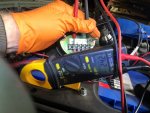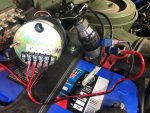- 1,836
- 987
- 113
- Location
- Paris KY
I’m in the process of installing a new 6.5 engine in my M1028 CUCV truck, mated to a rebuilt 700R4 transmission. Because the 700R4 will not require vacuum to operate, I have installed a HMMWV oil pump drive in place of the vacuum pump on the rear of the engine valley. Because the oil pump drive also drives a tachometer in HMMWVs, I am considering installing a HMMWV tachometer in my truck.
Question - what are/were the different variations of tachometers used in HMMWVs over the years? I’m thinking I would want to use the version which was illuminated with a bulb instead of translucency.
Thanks in advance for comments.
Question - what are/were the different variations of tachometers used in HMMWVs over the years? I’m thinking I would want to use the version which was illuminated with a bulb instead of translucency.
Thanks in advance for comments.





